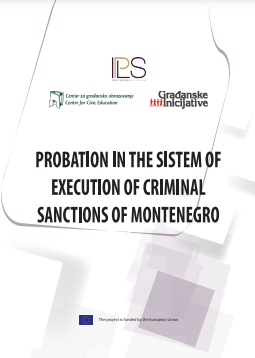Probation in the system of execution of criminal sanctions of Montenegro
Probation in the system of execution of criminal sanctions of Montenegro
Author(s): Milorad Marković
Subject(s): Criminal Law, International Law, Human Rights and Humanitarian Law, Penal Policy, Court case
Published by: Centar za građansko obrazovanje (CGO)
Keywords: Montenegro; penal policy; criminal law; probation; human rights; liberty deprivation; criminal sanctions;
Summary/Abstract: Alternatives to short-term imprisonment lies in increased humanity and economics of the execution of criminal sanctions, with perspective of positive influence to rehabilitation and re-socialization of convicted persons. They are, by their nature penalties, which should be distinguished from measures that may be imposed in the process of disposal of criminal prosecution by the State Prosecutor. They may be qualified as: Measures modifying execution of the deprivation of liberty sentence (house arrest and conditional release); Measures of warning as the alternative to sentence of the liberty deprivation (suspended sentence and judicial admonition); and other penalties as alternatives to liberty deprivation sentence (a fine, a community service, confiscation of driver’s license). The politics of criminal combating defines the manner on which the state wants to impact on the criminal reduce, in terms of the general prevention and greatly on the special prevention when the perpetrators of criminal acts are in question. The biggest role in rehabilitation and resocialization of perpetrators of criminal acts has criminal sanction that has been imposed to him/her and sanctions rehabilitation programs during its enforcement and after that. Special focus should be put on the short-term sentence of liberty deprivation due to frequency of their pronouncement, their nature as a basis for rehabilitation of the perpetrator of a criminal act as well as the state expenditures in the process of their execution. There is a constant dilemma in the theory and in the practice about the effectiveness of short-term penalties having in mind that they imposes for a period of time which is no longer than six months as well as the negative effects that short-term penalties produce. This primarily refers to the characteristics of persons who are sentenced to short-term prison sentences, these are usually persons who are coming in conflict with the law for the first time and who committed minor criminal offenses. On the other hand, taking into account the previous fact, institutes for execution of criminal sanctions, in our country and in surroundings, with the conditions and internal organization, influence on persons who come to the execution of shortterm prison sentences, and instead of being rehabilitated they get closer to the criminal groups. Therefore, in theory, prisons are often called the "crime schools". Aware of these shortcomings, as well as many others, with the beginning of this century, more and more attention is paid to alternatives of short-term penalties of liberty deprivation. Some of them are already present, they form a part of modern legislations and are often used in the past but did not gave satisfactory results because they were not monitored by rehabilitation programs and they more had a form of forgiveness rather than criminal sanctions . This refers to the admonition and suspended sentence. On the other hand, a fine is unpopular because of its specificity and often has been imposed as a secondary criminal sanction. Finally, the financial aspect through which the state budget bears the high expenditures for execution of short-term imprisonment and providing spatial and other capacities additionally depend the question of "cost-effectiveness" and the effectiveness of short-term imprisonment.
- Page Count: 58
- Publication Year: 2014
- Language: English
- eBook-PDF
- Table of Content
- Introduction

